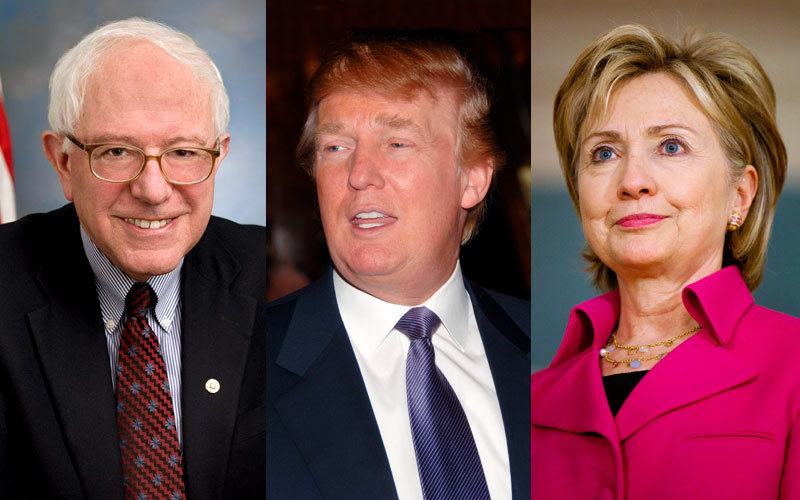
Ask millennials who they plan to vote for in the presidential election and they’ll tell you it’s the candidate who “speaks” to them. The candidate who’s talking about immigration reform, renewable energy and the high cost of education … on social media.
The tactical tweet, the strategic photo of a hug, the art of going viral — these are what makes politicians “genuine” to young voters. Although few of the candidates ever touch their own Twitter, Facebook, Instagram or YouTube accounts, voters born between 1980 and 2000 say that’s how they’re following candidates Bernie Sanders, Hillary Clinton and Donald Trump.
And why not? A Pew Research Center study released days ago confirmed a trend has shifted to an official tipping of the scale: 62 percent of all Americans now get news from social media.
Social media offers it all, videos, facts, summaries and all in small doses.
“There’s a lot more information for us to dissect, and I also feel like we have control over it, instead of relying on newspapers and other media. It’s more unfiltered,” says Christian Gutierrez, a junior studying history.
Social media platforms offer more imagery of the candidates, says communications student Aaliyah Hernandez, and she follows their mannerisms and habits, including how they handle protesters. Social media offers up ample videos showing Clinton cutting off protesters and Sanders engaging them, Hernandez says.
It’s a down-to-the-wire race between Democrats Sanders and Clinton for a California primary win Tuesday. A win for Clinton could help her pick up enough delegates to get the majority needed for the party nomination. Millennials are among the power groups that could decide the Democratic candidate to face Trump, the presumptive Republican nominee, in November.
“Hillary would love for her campaign to end on a big win and to use that as momentum to unify the party,” says Stephen Stambough, professor of political science. “A speech that night on a win will go a long way to unify the party and define where to go in the fall. Bernie’s speech will as well.”
At 83 million, United States millennials outnumber baby boomers by 8 million. Like boomers, millennials represent about 31 percent of the eligible voters. But the millennial voice has more influence as young masters of the most popular social platforms, and not only among friends. Millennials also have a greater capacity to influence slightly older demographic groups — who vote in larger numbers.
CSUF communications and political science students are likely to become more vocal, hosting campus debate-viewing parties and political rallies in the fall. These events help shift the political scramble from abstract social media posts to live, on-campus discussions as the November election approaches, says Jon Bruschke, professor of human communication studies. Professionals who consult politicians and track voters are set to join classroom discussions about influence, elections and voting history. But how students will vote is less predictable.
Researchers who study millennials in comparison to young voters of the late 1960s say today’s young Americans are less politically engaged, perhaps because delayed careers, marriage and children also delay their political involvement. Although a tally by Political Data Inc. shows Orange County’s Republican stronghold has shifted downward from a 22 percent lead over Democrats to just a 7-percent lead — mainly because of millennials favoring the left — on a national level, young voters aren’t aligned with either political party.
Early polls, including a USA Today and Rock the Vote Millennial Poll in January, showed fewer than 40 percent of millennial voters said they planned to vote in the primaries, and only about 60 percent said they would vote in November. And the group is growing disenchanted with each defiant barb and raucous rally.
The hate isn’t popular, the candidates don’t offer straight answers, and they’d rather fight than address issues that matter to voters, says Taylor Cesena, a junior studying communications. “Personally, I think they’re all a bunch of clowns,” Cesena says. “I want to vote, but at this point, I really don’t know who I’d vote for.”
In contrast to the 2008 presidential election, which was also social-media driven, young people are most inspired by a candidate far older than most millennials.
“One of my students said Bernie reminded her of the grandfather you can’t wait to visit at Christmas,” Stambough says.
This presidential election is more about “affect” rather than “issues,” says Stambough. “For Trump that’s anger, for Bernie it’s a chance to put your stamp on the world.” But young voters yearn to connect with a candidate, he says.
“On the left, the [young voter] is struggling — with how much they fear and almost hate Trump, and is that enough to inspire them to vote for someone they never really had a connection with,” says Stambough. “The unrealized potential is in the younger Libertarian groups. But that runs counter to Trump’s nativist approach.”
Most polling and research on the young vote has stalled until after Tuesday’s primary — which is expected to mobilize voters of all ages.
Gutierrez says for now his vote has more strength in a local Assembly race. The presidential process and the role of superdelegates is “undemocratic and dated,” Gutierrez says. “To me, if it’s Hillary and Trump, I probably won’t vote for president at all.”